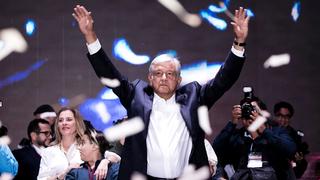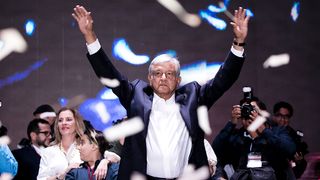Following a landslide victory in Mexico's presidential election, Andres Manuel Lopez Obrador is president-elect of one the world's most populous democracies.
The political coalition he leads, Juntos Haremos Historia - which encompasses the newly formed Movimiento Regeneracion Nacional (Morena), the Labor Party (Partido del Trabajo) and the Social Encounter Party (Partido Encuentro Social - controls of both houses of the Mexican legislature.

This means that Lopez Obrador (better known in Mexico and around the world by his initials, "AMLO") has the clearest mandate in modern Mexican political history, garnering 53% of the vote - more than 20% points higher than his nearest rival.
It also represents the largest margin of victory in Mexico since 1982, the last year of a notoriously corrupt series of elections stretching back to 1929 which saw the ruling Partido Revolucionario Institucional (PRI) stand virtually uncontested.
It's no wonder that, in 1990, following the PRI's theft of the 1988 presidential election from the reformist progressive Cuauhtemoc Cardenas, the Peruvian Nobel Laureate Mario Vargas Llosa would call Mexico a "perfect dictatorship."
The one thing that unites the more than 130 million Mexican citizens across the political spectrum, not to mention all the recent presidential candidates, is an unvarnished disdain for the leader of their largest neighbour.
AMLO is a throwback progressive who is similar in age, background, philosophy, intellectual curiosity and instrumentalist political ideology to Bernie Sanders and Jeremy Corbyn, who counts AMLO as a long-standing friend. Like Sanders and Corbyn, AMLO has pushed a simplified platform of overwhelmingly popular ideas refreshingly devoid of a technocratic fetishism. And just as Sanders has emerged overwhelmingly as the most popular politician in the United States, and Corbyn has dragged the Labour Party back from its electoral death bed, AMLO has secured one of the most impressive political victories in modern political history.
I'm also struck by the potential that AMLO's Mexico has to become an effective counterweight to Trumpism - certainly more effective than the current Democratic Party, as well as America's self-styled #Resistance. To be clear, AMLO's election is not about the United States and Donald Trump per se. Rather, it reflects a deep disaffection with the economic inequality, corruption and violence that pervade Mexico. But as multiple observers have pointed out, the one thing that unites the more than 130 million Mexican citizens across the political spectrum, not to mention all the recent presidential candidates, is an unvarnished disdain for the leader of their largest neighbour.
How could it be otherwise? Donald Trump's presidential campaign took off in 2015 when he claimed that Mexican immigrants are "rapists." Whenever his poll numbers dip or he somehow feels threatened, Trump doubles down on anti-immigrant rhetoric directed disproportionately against Mexican and other Latin American immigrants. But while each of the candidates took turns disavowing Trump over the course of the campaign, it was AMLO who repeatedly compared Trump's rhetoric toward Mexicans and other Latin Americans to that of Hitler toward Jews in the 1930s.
AMLO committed Mexico to the defence of the rights of Latin American immigrants in the United States by providing legal council to the thousands of Mexican citizens and other Latin Americans caught up in Trump's war on refugees.
So while AMLO's victory is not about Trump or U.S. policy concerning Mexico in any direct fashion, Mexicans are nonetheless aware that U.S. influence over Mexican economic and social policies has played a decisive role in determining the fortunes of their country since the 1970s. Since that time and the end of the so-called "Mexican Miracle," the country's economic policies have been increasingly dictated by the United States government, the World Bank and the IMF.
Nearly half of Mexico's population lives in poverty; the country is riddled with corrupt and ineffectual local governance; there is declining access to quality health care and education; there is an unremitting, violent struggle for control over the shipping lanes to the world's largest and most lucrative narcotics market, exacerbated by Mexico's own disastrous war on drugs - these are all inextricably connected to United States influence over internal Mexican policy. The program begun under Barack Obama, and continued under Trump, of stopping refugees and dividing families at Mexico's southern border, thereby preventing them from ever reaching the United States, is an immigration policy decided in the District of Columbia, not in the Distrito Federal.
In a series of speeches collected and published in a book titled Oye, Trump! ("Listen Up, Trump!"), AMLO lays out a program that strongly asserts Mexican sovereignty over its own internal economic and social affairs. He develops policies around energy independence and agricultural prices - which are particularly important given the profound inequality in Mexico's rural south, where the last comprehensive survey found more than 60% of people living in poverty. He proposes a requirement in free-trade zones that American companies that frequently pay $30 per hour in the United States don't outsource jobs to Mexican workers unless they're paying them a local living wage - a boon for everyday Mexicans and Americans alike. He also committed Mexico to the defence of the rights of Latin American immigrants in the United States by providing legal counsel to the thousands of Mexican citizens and other Latin Americans caught up in Trump's war on refugees.
While none of these policies, on their own, is a silver bullet against the worst abuses of Trumpism, taken together they represent a more coherent, compelling challenge than anything the Democratic Party can currently muster: from the provision of practical aid to Central American refugees seeking to claim their right to legal status in the United States, to similarly concrete assistance to Mexican citizens (who constitute the backbone of the America's low-waged workforce and the basis of much corporate profit, and thus possess a collective power within the American economy as yet unexercised) which compels American companies to provide cost-of-living adjusted equal pay for equal work to Mexicans.
Are we really to believe such a simplistic conception of "populism" is enough to collapse the vast gulf between two leaders who have diametrically opposed positions on economics, education, women's rights, wages and labour rights, foreign policy, health care, environmental protection and refugee recognition?
The implementation of such policies has the potential to effect more change in the United States than a Democratic Party currently devoid of formal power and a protest movement unable to rise above mere gestural politics.
And yet some of our more superficial, incurious, frankly rather juvenile commentators, who have never bothered to delve into AMLO's vast corpus of published writing, draw a connection with Trump by calling Andres Manuel Lopez Obrador a "populist." The basis for this comparison, it seems, stems the fact that both men claim some aspect of their respective nation's system is "rigged" by certain groups. In the case of AMLO, the rigging is done by those who received or maintain political and economic power through sweetheart deals with large-scale multinational businesses, by means of a Faustian pact with drug cartels, or through voter intimidation and outright fraud. For Trump, the rigging is achieved by a similarly powerful cabal of destitute Latin American immigrants and Muslims.
But are we really to believe such a simplistic conception of "populism" is enough to collapse the vast gulf between two leaders who have diametrically opposed positions on economics, education, women's rights, wages and labour rights, foreign policy, health care, environmental protection and refugee recognition? Leaders whose estimation of the importance of personal modesty, political probity, economic transparency and intellectual curiosity - not to mention their love of their respective country's deep geographical, cultural and social diversity - could not be further apart?
Beyond the borders of Mexico, the significance of AMLO's election is that it holds out the possibility of providing real resistance to the worst of Trumpism in the United States, while also laying bear the bankruptcy of political analysis around the world that assumes that all disaffection with the status quo is somehow equal, despite diametrically opposed public policy and personal morality. AMLO's historic victory, based on the acknowledgement of deep social dislocation and inequality, combined with simple, effective, popular proposals to alleviate these problems, is one of the most important data points yet in the ongoing struggle to shape what victorious politics looks like in an age of Trump and other reactionaries.
In a year so devoid of causes for hope, these are immensely important developments.






